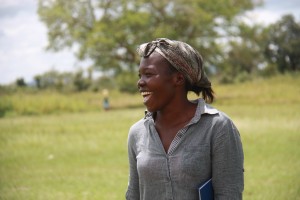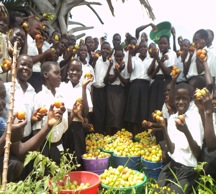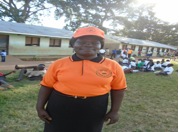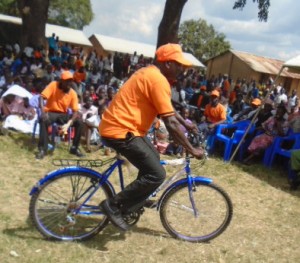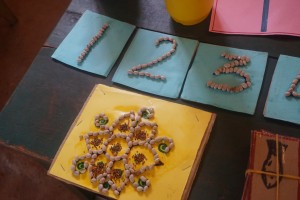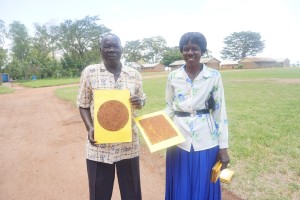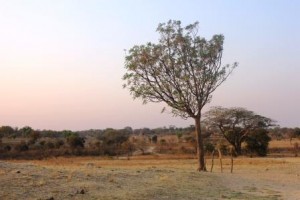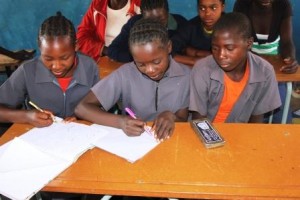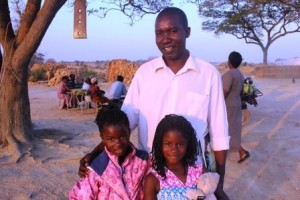African Revival’s Babra: “The SDG is a solution to the problems our rural schools face”
November 11, 2015
Babra Akello, aged 27, is African Revival’s Agricultural Project Officer. Here, Babra gives us an insight into the progress of the School Demonstration Garden project, including the benefits and challenges of the project, and some uplifting success stories that she has witnessed while working closely with the parents and students.
Looking at the situation where our beneficiaries are, I feel the SDG has come as a solution to the problems that our rural schools face. Because looking at the rural schools, parents are so far away from the school, parents are not always willing to contribute to the development of the school, so the school management and the head teachers have to pull ropes with the parents. When it reaches the time of examinations, pupils have not paid, but the school has to buy chalks, reference books etc. But the SDG brings parents closer to the school, opening their eyes to the school and contributes towards the development of the school.
And by them coming to the school, they are not just coming to work on the project, but they are coming to check on the progress and education of their children. And this follow-up for any other parents who are not involved is hard to do. And then it is benefiting them because as they come to work, they are learning different knowledge in agricultural practices, in saving the money, in actually planning for their home, and actually finding appropriate solutions to their household problems.
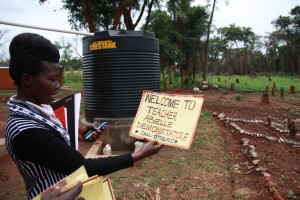 Also in a way, its even helping the communities to wipe away gender based violence. You know, most times, if all the family, the husband and wife are involved in the project, this means that they are going to listen to such messages. Because as we train them, there are crosscutting issues that I as a technical person, I do touch. On top of what the project wants from us, after training in the good agricultural practices, after doing the VSLA, there are issues of gender based violence, of HIV prevalence that we always touch upon. So in a way, the parents are all benefitting, and when they get home, they can’t now fight in their house, they can now sit together and plan for their home, plan for their education of their children.
Also in a way, its even helping the communities to wipe away gender based violence. You know, most times, if all the family, the husband and wife are involved in the project, this means that they are going to listen to such messages. Because as we train them, there are crosscutting issues that I as a technical person, I do touch. On top of what the project wants from us, after training in the good agricultural practices, after doing the VSLA, there are issues of gender based violence, of HIV prevalence that we always touch upon. So in a way, the parents are all benefitting, and when they get home, they can’t now fight in their house, they can now sit together and plan for their home, plan for their education of their children.
The agricultural practices that they learn, when they replicate at their household level, they are going to increase on their production. This means they are going to have surplus food at a household level, where they can have enough to eat, where they can have enough to keep, where they can have enough to sell and cater for other basic needs. They will be in the position to pay school fees, buy scholastic materials.
So far I would say that the project is progressing fast looking at the level we have reached. We have sensitized, we have formed the groups, we have initiated the SDGs, we have already got some harvest from the garden. And also the most interesting thing, you know the people we train, there are people who are fast learners, people who are medium, people who takes time to understand. And the most interesting part is that the fast learners have already even got to the level of replicating what they have learned form the SDG at home. So to me, that is already progress in the project.
As a good trainer, much as there are fast learners, you concentrate most on the medium and slow learners, so they can catch up with the fast learners. So like with the parents group, we cannot now say we are going to push them push them – what you do, each and every time you give assignments, today we’ve learned this, and next week people should begin replicating, and when you are looking out for who has replicated, you start out with the slow learners, asking ‘have you done this’ in a good way because you don’t have also to make them know that they are slow in learning. You just use your facilitating talents to make them also understand and slowly slowly, they will also come to understand.
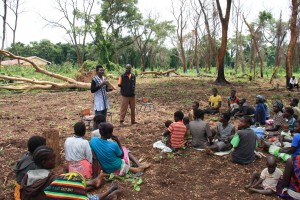 One of the challenges of the SDG is the issue of land dispute. You know, land issues in the Acholi region are not something easy, especially in Langera. During the project launch in the district, one of the committee members of the school just stood up boldly and said ‘I don’t think this project is going to work because in Langera we don’t have so much land’. And that school was already assigned to me, so I felt like ‘how am I going to overcome this?’. But something came into my mind that ‘no you go on, and do what you’re supposed to do, and maybe it can turn out to be a success story’. And when I went for the mobilisation, I found the head teacher who told me, ‘you know what, you don’t have to fear, you just come, the school is there, we are going to work together, and overcome these land issues, and what we are going to do, we are going to sit with these management committees, and make sure we apportion the SDG site to be on the other side where they are wrangling over”. So the parents came, and I used my tricks with the parents to ensure that we succeeded. And the parents were on my side, everything went well, and right now Langera stands to be a success story because there are no more land wrangles, and when the bestseller donor came, the chairperson of the SMC even highlighted that as a success – that the SDG has enabled us to solve the land issues that were in the school. So that wasn’t easy to reach the level we have now.
One of the challenges of the SDG is the issue of land dispute. You know, land issues in the Acholi region are not something easy, especially in Langera. During the project launch in the district, one of the committee members of the school just stood up boldly and said ‘I don’t think this project is going to work because in Langera we don’t have so much land’. And that school was already assigned to me, so I felt like ‘how am I going to overcome this?’. But something came into my mind that ‘no you go on, and do what you’re supposed to do, and maybe it can turn out to be a success story’. And when I went for the mobilisation, I found the head teacher who told me, ‘you know what, you don’t have to fear, you just come, the school is there, we are going to work together, and overcome these land issues, and what we are going to do, we are going to sit with these management committees, and make sure we apportion the SDG site to be on the other side where they are wrangling over”. So the parents came, and I used my tricks with the parents to ensure that we succeeded. And the parents were on my side, everything went well, and right now Langera stands to be a success story because there are no more land wrangles, and when the bestseller donor came, the chairperson of the SMC even highlighted that as a success – that the SDG has enabled us to solve the land issues that were in the school. So that wasn’t easy to reach the level we have now.
Schools are experiencing land disputes, because initially in the rural communities, somebody will just come willingly and give out land for the school. And at times they go into signing maybe an agreement that I am giving this portion of land. But eventually the person dies and either the children or the grandchildren now begin disturbing the school, and also most of the schools do not possess a land title, so such issues makes conflicts to always arise.
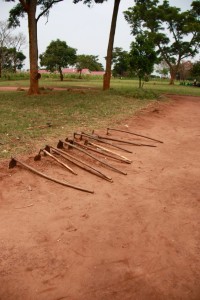 One of my favourite moments of the project was in Layima Primary School. Layima has been a school where the parents are so so much interested in the project; their numbers have been overwhelming. When you take a project in the community, the expectations are always so high, but we have a budget line that we are supposed to operate within, and it can look quite challenging. At Layima, especially the tools for the beneficiaries – at first this looked like it was a challenge because the numbers were up to 80 members, but there were only 47 hoes. My favourite moment came when we had to sit down with the parents and make them understand that this other support, the tools are just brought to ensure that work starts, but they themselves have to own the project, and if they are willing they can even contribute towards the project by coming with their hoes. And it was an amazing moment when the members agreed that ‘lets first put these hoes intact and use our own hoes’. Even up to now, we’ve not distributed the hoes, and the parents are thinking of giving them to the school, so that the entrepreneurship club can be using it. That was my favourite moment because it felt challenging but a solution was derived.
One of my favourite moments of the project was in Layima Primary School. Layima has been a school where the parents are so so much interested in the project; their numbers have been overwhelming. When you take a project in the community, the expectations are always so high, but we have a budget line that we are supposed to operate within, and it can look quite challenging. At Layima, especially the tools for the beneficiaries – at first this looked like it was a challenge because the numbers were up to 80 members, but there were only 47 hoes. My favourite moment came when we had to sit down with the parents and make them understand that this other support, the tools are just brought to ensure that work starts, but they themselves have to own the project, and if they are willing they can even contribute towards the project by coming with their hoes. And it was an amazing moment when the members agreed that ‘lets first put these hoes intact and use our own hoes’. Even up to now, we’ve not distributed the hoes, and the parents are thinking of giving them to the school, so that the entrepreneurship club can be using it. That was my favourite moment because it felt challenging but a solution was derived.
Another amazing moment was in Abera p/s. During the formation, this group had the highest expectations, more than any other group. With the trainings and mentorship, they turned out to be the best group via production and they are a group of 55 members only, but they are quite hardworking. And as I talk now, they are still leading in the production record. For the first season, they have actually got 1.7 million out of their production, and we are expecting more for the second season. So that actually amazed me, because looking at that, it makes me feel like the effort, my travel there, my trainings, has yielded fruits. So it gives me happiness.
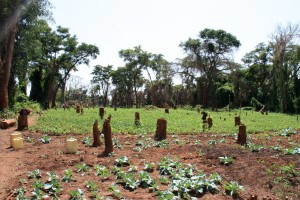 I hope that the project will achieve all its objectives. Looking at the objectives of bringing the parents closer, increasing the retention rates of the pupils in school, ensuring the school feeding program, increasing productivity – with the speed we are going, I hope we will achieve all the objectives.
I hope that the project will achieve all its objectives. Looking at the objectives of bringing the parents closer, increasing the retention rates of the pupils in school, ensuring the school feeding program, increasing productivity – with the speed we are going, I hope we will achieve all the objectives.
Posted in News | Tagged African Revival, Uganda | Leave a comment
Its Harvest Time: Photo Essay
November 10, 2015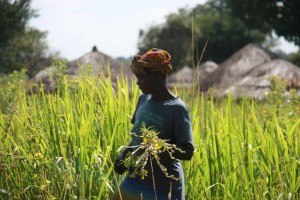 At Olaa Amilobo Primary School, the Parent’s group has been working hard for the last four months. As part of the School Demonstration Garden project, implemented by African Revival in partnership with the Bestseller foundation, they planted simsim (sesame) and have carefully nurtured it over the last few months, protecting it from the destructive path of stray animals and irrigating it during the prolonged drought that affected Amuru district. And now it is time for the harvest. This photo essay documents a day of the harvest, showing the different stages of the process, as well as the group and its individual members. We hope you enjoy it!
At Olaa Amilobo Primary School, the Parent’s group has been working hard for the last four months. As part of the School Demonstration Garden project, implemented by African Revival in partnership with the Bestseller foundation, they planted simsim (sesame) and have carefully nurtured it over the last few months, protecting it from the destructive path of stray animals and irrigating it during the prolonged drought that affected Amuru district. And now it is time for the harvest. This photo essay documents a day of the harvest, showing the different stages of the process, as well as the group and its individual members. We hope you enjoy it!
Photo essay: https://shicks.exposure.co/harvest-time
Posted in News | Tagged African Revival, Garden, Harvest, Photo essay, Uganda | Leave a commentSuccess for the Pupil’s Club at Paminyai Primary School!
November 6, 2015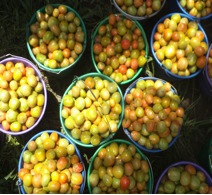 African Revival, as part of a community empowerment project, started working with Paminyai Primary School in 2012, implementing amongst other projects the School Demonstration Garden. In June 2014, the project was taken over for six months by LEARN, before finishing in December 2014. The School Demonstration Garden at Paminyai was very well received by the students and parents and demonstrated some very positive outcomes. Find out more about the farming success of the Pupil’s club below!
African Revival, as part of a community empowerment project, started working with Paminyai Primary School in 2012, implementing amongst other projects the School Demonstration Garden. In June 2014, the project was taken over for six months by LEARN, before finishing in December 2014. The School Demonstration Garden at Paminyai was very well received by the students and parents and demonstrated some very positive outcomes. Find out more about the farming success of the Pupil’s club below!
In May 2014, the pupils’ club at Paminyai Primary school planted onions in a 10m by 10m plot and tomatoes in a 20m by 30m plot. The members had acquired the seeds with a 100,000 Uganda Shillings grant from us and they borrowed an additional 20,000 Ugandan Shillings from a village savings and loans scheme started by the parents. They used this money to buy pesticides to safeguard their crops. In October 2014, the pupils’ investment paid off when they harvested 94kg of onions and 767kg of tomatoes, which they sold at 2,500 Ugandan Shillings and 2,000 Ugandan Shillings per kg respectively. From a humble investment of 120,000 Ugandan Shillings the pupils earned 1.7 million Ugandan Shillings after 5 months of hard work! They split 50% of their earnings among themselves, placed 30% in their club savings account and gave the remaining 20% to compensate the school for contributing the land.
After the profits were in, African Revival staff conducted mentorship sessions with the parents of the club members, together with the focal teacher, and agreed on what each pupil wanted to spend the money on and how much to save. Most of the pupils spent the money on scholastic materials and exams/school fees .The pupils were very happy with their share of the profits and promised to work harder in the following year. And they have kept their word. This year, 2015, the club has planted more tomatoes and other classes have also joined – the Pupil’s Entrepreneurship Club is now leading the entire school in tomatoes production!
Posted in News | Leave a commentWorld Teachers’ Day – Celebrations Ugandan style!
October 8, 2015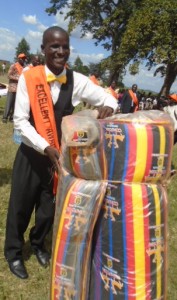 On the 5th of October every year, World Teachers’ Day is held to honour the hard work and dedication of teachers all across the globe. And Anaka, a town in the Nwoya district of Northern Uganda, wasn’t about to miss out on the celebrations! This year, the town council organised an awards ceremony to allow the local community to celebrate the achievements of its teachers, while also raising awareness of the vital contribution that teachers make to education and development. During the ceremony, the resident district commissioner presented awards to certain teachers who had exhibited excellent teaching performance. Prizes included a bike and a mattress – practicality always comes first in Uganda!
On the 5th of October every year, World Teachers’ Day is held to honour the hard work and dedication of teachers all across the globe. And Anaka, a town in the Nwoya district of Northern Uganda, wasn’t about to miss out on the celebrations! This year, the town council organised an awards ceremony to allow the local community to celebrate the achievements of its teachers, while also raising awareness of the vital contribution that teachers make to education and development. During the ceremony, the resident district commissioner presented awards to certain teachers who had exhibited excellent teaching performance. Prizes included a bike and a mattress – practicality always comes first in Uganda!
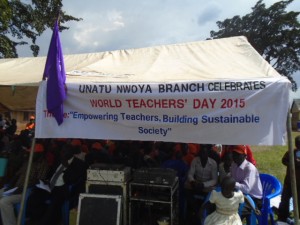 African Revival’s Early Childhood Development (ECD) Programme Officer, Maxwell Kinyera, attended the celebrations and interviewed some of the teachers themselves, whose commitment to their role is the backbone of the nation’s education system. Read Maxwell’s interviews below, in which the teachers reveal how they celebrated World Teachers’ Day and what they hope for their pupils and school in the future, and offer some words of advice for Newly Qualified Teachers all over the world!
African Revival’s Early Childhood Development (ECD) Programme Officer, Maxwell Kinyera, attended the celebrations and interviewed some of the teachers themselves, whose commitment to their role is the backbone of the nation’s education system. Read Maxwell’s interviews below, in which the teachers reveal how they celebrated World Teachers’ Day and what they hope for their pupils and school in the future, and offer some words of advice for Newly Qualified Teachers all over the world!
Florence, aged 33, is a teacher at St. Luke Primary School in Nwoya district. To celebrate world teachers’ day, she prepared her children to present a poem. In the future, she wants her pupils to become responsible members of the community they live in, while she wants her school to be a centre for academic excellence. Florence has undergone two teacher trainings; refresher training on learning aids development and training on child protection. She believes teachers’ training should focus on developing teachers holistically so that the teachers should be able to produce children who are all rounded citizens. She welcomed and encouraged teachers out there who have just finished college to join the profession with all their heart even if the pay is small.
To celebrate World Teachers’ Day, Omona, a teacher at Anaka P.7 School, prepared her pupils to present welcome songs and dances to entertain the guests. In the future, she wants these pupils to have better lives through good jobs. In order to achieve this, she hopes for better classrooms and academic performance in her school. Omona received two trainings organised by African Revival. She added that the training helped her to develop a growth mind-set and become a better teacher. According to her thinking, teachers’ training should focus on academic and adolescent sexual reproductive health and rights. To encourage other teachers across the world who have just finished training, she said they should have positive attitude towards teaching. She appealed to them to prepare fully.
Mr. Patel is the Head-teacher of Purongo Hill Primary School, who was voted the best head teacher in the district (and as a prize received a bike – which he can be seen riding in the photo!). He contributed money towards the World Teachers’ Day celebration and he was among the organising committee for the district level celebration. Mr Patel holds a diploma in primary education and several on-job trainings related to his functions. He thinks teachers’ training should focus on attitude change and curriculum delivery, and encourages newly qualified teachers to love their profession and be committed teachers. He added that through hard work they can make them stand out from the crowd and be recognized by others. When teaching, Mr Patel enjoys being orderly and giving facts and career guidance to the learners. In the future, he wants his pupils to work hard to become better members of the society, taking up leadership positions and even replacing them in the teaching profession. He wants his school to be the best, and a model school where people and other schools come to learn from.
Interviews and photos by Maxwell Kinyera, Early Childhood Development (ECD) Programme Officer at African Revival.
Posted in News | Tagged Education, Teachers, Uganda, World Teachers' Day | Leave a commentTeacher Profile: Meet Kuluse
September 29, 2015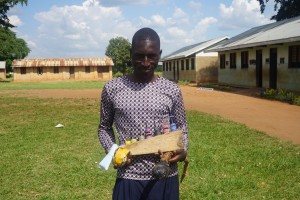 Kuluse, 25, is a nursery teacher in Kamboli district in Northern Uganda. He has just finished his training in Early Childhood Development and nursery education at Gulu Primary Teaching College. Newly qualified and raring to go, Kuluse draws his motivation from his students’ passion for life and learning. Kuluse shared his teaching experiences with African Revival when we met him at a Jumpstart ! teacher training
Kuluse, 25, is a nursery teacher in Kamboli district in Northern Uganda. He has just finished his training in Early Childhood Development and nursery education at Gulu Primary Teaching College. Newly qualified and raring to go, Kuluse draws his motivation from his students’ passion for life and learning. Kuluse shared his teaching experiences with African Revival when we met him at a Jumpstart ! teacher training 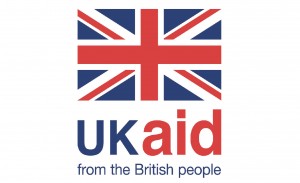 session, implemented by our Education team and funded by the UK Department for International Development’s UKAid match programme.
session, implemented by our Education team and funded by the UK Department for International Development’s UKAid match programme.
I first started as a part time teacher. Later I joined a training course to become a teacher. I joined ECD training because I felt love for the children. I never wanted to be a teacher, I was just fascinated by the childen’s behavior. I enjoy most of the learning areas, but I love observing the children’s lifestyles, seeing how they try to relate to each other and watching them develop as people. I enjoy watching them be creative, its the part of the teaching I really enjoy.
I enjoy teaching maths. It was one of my favourite subjects during my childhood, right until I reached my advanced level. I still took maths as part of my A level combination, so naturally I love maths.
There are challenges that you face as a teacher when joining a school. One of the challenges is that we are a young school, so we are still lacking a lot of materials, but we want to appreciate African Revival because they have always given us support. Another thing is the parents; they are not very encouraging, they were speaking badly about the school.
But the good thing is, the time I spend with the children in class, it makes me feel very relaxed. Sometimes I don’t even feel like releasing them to go home, because when I’m with them I’m enjoying my time. My children don’t want to leave. One time they said ‘teacher we are going with you !’ so they don’t feel like leaving. They enjoy it so much. Sometimes after the daily routine, they sit down and say, teacher now it is time to dance. The traditional cultural dances – they enjoy it so much.
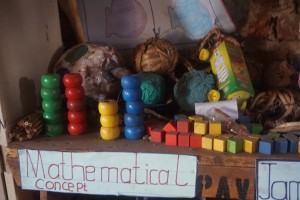 I’ve really achieved a lot by attending this [Jumpstart !] training. In fact yesterday I didn’t sleep. I spent most of the night working on my learning aids, because I felt like if I spend the time now, I will make a lot of things that will help me in class.
I’ve really achieved a lot by attending this [Jumpstart !] training. In fact yesterday I didn’t sleep. I spent most of the night working on my learning aids, because I felt like if I spend the time now, I will make a lot of things that will help me in class.
During training we learnt about how we can take part in developing the school. We should sell our school by the commitment that we give to the children. We should not mind the current situation and work hard to build a better quality, and once the quality comes, it will sell the name of the school and attract the parents’ attention towards the school. Then there are other ways, like materials that we use. We shall be creative so that the money that we could have used on buying these learning materials, we save it for other things.
The best thing I got [from attending these workshops], is that I shared the experience with my colleagues. Things that I never knew how to do, I learned from my colleagues, because the trainers encouraged us to have group work activities, so we worked well in teams.
My wish for my school is first class knowledge. Most of the knowledge I’m having here, I want to go and share it with my fellow staff to make sure we take our school to the best level of education standards. I also wish that, in sometime to come, I shall be one of the authors of, or write a book that will help teachers know how to pursue their teaching dream.
Nursery education is the foundation of our nation.
If the foundation is built well, our dreams for Uganda will all come to pass.
Posted in News | Tagged ECD, Education, Gulu, Jumpstart!, Nursery, School, Teacher training, Uganda | Leave a comment
Jumpstart! news update: Making Acholi learning aids from local materials!
September 24, 2015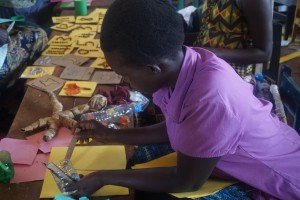 When we visited the classrooms at Anaka Primary 7, every inch of wall space was occupied by colourful learning aids depicting letters, numbers and local folk tales. The school was hosting an African Revival Jumpstart! training workshop for teachers from local nursery schools that focused on:
When we visited the classrooms at Anaka Primary 7, every inch of wall space was occupied by colourful learning aids depicting letters, numbers and local folk tales. The school was hosting an African Revival Jumpstart! training workshop for teachers from local nursery schools that focused on:
- How to make learning aids from raw local materials at nursery level
- Using learning resources in the local Acholi language
The participants learned how to source raw materials from the natural environment and use them to make a variety of educational equipment in the local Acholi language.
Local materials are an incredibly cheap source of learning aids, and also familiar to the children, which helps to facilitate their understanding of new concepts. Teacher trainer Martina explained how using learning aids made of local materials can help children to master their environments:
‘The children develop a precision for what is in their environment. When they see a pot made of clay, they know what clay is called, they begin to value and appreciate their environment and later they can also develop skills in making those materials themselves, helping them professionally later on.’
Furthermore, nursery-teaching resources written in the local Acholi language enhance the students’ learning because it is the language they use at home.
The language of instruction throughout the schooling system in Uganda is English. However, research confirms that children learn best in their mother tongue as a prelude to bilingual education because it allows them to develop stronger reading, writing and mathematical skills. This lays the foundations for their future education and acquisition of more complex concepts. Moreover, using Acholi language materials can boost the self-confidence and motivation of pupils and increase their interest in what they are learning – because they understand it! Martina described the benefits of using Acholi learning aids:
‘Firstly, the children in the nursery schools are still developing their language and still using the local language at home. So we hope that, when they come to school and get materials in the local language, they will develop their language skills fast because they understand it. At home we call a pot ‘agulu’ – when they come to school they also find ‘agulu’, so they develop reading and writing skills faster.
But teacher trainer Ojok Ojara, who underwent two years of ECD teacher training in Australia, admits there are some challenges persuading the local communities of the benefits of teaching nursery and primary classes in Acholi:
‘People think that when you teach in Acholi, you are not teaching in English. But you can teach in both! Let the children develop the language they really use at home, let them master it. They will learn the second language very quickly.’
Ojok Ojara is now advocating for the introduction of English only after children have completed class 3 of primary school, aged 8. Indeed, children who have a firm grounding in Acholi and have been given the opportunity to develop skills and conceptual understanding in their mother tongue, will learn English quicker than children who have been instructed purely in English. In addition, they are more empowered as learners when taught in their mother tongue, which they can now study all the way to university level in the Ugandan education system
The African Revival training focused on the importance of the use of Acholi in the classroom, while also showing participants practical ways of incorporating the language into the classroom using handmade learning aids. Trainers Martina and Ojok Ojara expressed their firm hope that the teachers would take away the new techniques and adapt them to their own classrooms, and plan to monitor their progress. But the level of motivation amongst the trainees is high. When asked if he enjoyed the training sessions, nursery teacher Kuluse admitted:
‘Yes! In fact yesterday I didn’t sleep. I spent most of the night working on my learning aids, because I thought I will make a lot of things that will help me in class, so I’ve really achieved a lot in this training.’
 We hope he doesn’t stay up every night making new resources – teaching is a tiring job! Kuluse is clearly very passionate continuing professional development for teachers, which he sees as the key to raising education standards in Uganda, and hopes to share his new knowledge with his colleagues. He also views Early Childhood Development as integral to his nation’s progress:
We hope he doesn’t stay up every night making new resources – teaching is a tiring job! Kuluse is clearly very passionate continuing professional development for teachers, which he sees as the key to raising education standards in Uganda, and hopes to share his new knowledge with his colleagues. He also views Early Childhood Development as integral to his nation’s progress:
‘Nursery education is the foundation of our nation. If the foundation is built well, our dreams for Uganda will all come to pass’
With more and more Acholi being introduced into nursery education, in conjunction with vibrant, engaging and locally sourced learning aids, we are sure this foundation is growing stronger by the day.
Posted in News | Tagged African Revival, ECD, Education, International Development, Nursery School, Uganda | Leave a commentTeacher Profile: Meet Mrs. Shanachenga!
September 17, 2015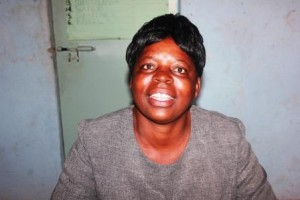 We would love to introduce you to Mrs. Shanachenga, the acting head-teacher of Inkumbi Basic School, located in southern Zambia’s Zimba district. Mrs. Shanachenga lives on the school compound in one of the teachers’ houses with her husband and some of her children, including her youngest, Timothy, who is enrolled in grade 1 at the school. The mother of seven children, Mrs. Shanachenga’s family is rapidly expanding; she already has five grand-children!
We would love to introduce you to Mrs. Shanachenga, the acting head-teacher of Inkumbi Basic School, located in southern Zambia’s Zimba district. Mrs. Shanachenga lives on the school compound in one of the teachers’ houses with her husband and some of her children, including her youngest, Timothy, who is enrolled in grade 1 at the school. The mother of seven children, Mrs. Shanachenga’s family is rapidly expanding; she already has five grand-children!
Mrs. Shanachenga qualified as a teacher in 1994 in Livingstone, and then went on to study for an additional teaching diploma before beginning her teaching career in 1995. Mrs. Shanachenga has been at Inkumbi Basic School for almost two years now teaching Grade 2, and she is also enjoying her new position as the acting head-teacher: “I am enjoying being the acting head-teacher; I am learning a lot. When you are not in administration, you might look and say that it is an easy job, but now that I am in this position, I have learnt that it isn’t easy- there are a lot of challenges but I like it. I would love to be promoted to be a permanent head-teacher one-day!”
Mrs. Shanachenga loves teaching, but it actually wasn’t her original career choice. However, she just couldn’t ignore her natural aptitude for teaching: “at first I had no interest in teaching, I wanted to work in the government in the Ministry of Defence; I went for interviews but I failed. However, I knew that I had a talent for teaching. That gift was apparent from when I was young…my fellow pupils would ask me to teach them, because I was very good especially in maths and science. After class, if my peers didn’t understand something, they would ask me to teach them, so I would go to the blackboard and explain the lesson to them again. It showed that I was a teacher from birth so it made sense to go into teaching; it was very easy and very natural to me.” It seems that Mrs. Shanachenga has inspired a new generation with her love for teaching, as her oldest daughter will be following in her teaching foot-steps and will be starting teacher-training next year!
Mrs. Shanachenga particularly enjoys teaching younger classes, and loves teaching her grade 2 class and contributing towards their development: “with teaching, what I like most is that you can see how children develop- some children have no problems learning, but others may need help. And once you help them nicely, then they will catch up. I like using my special skills to help all my pupils do well.” Mrs. Shanachenga hopes that with help, her pupils will grow up to “enjoy employment. Once the children are well-educated, mixing with people is easy and they will be able to go anywhere and do anything as long as they have their education.”
Although it is a rewarding vocation, being a teacher in a rural school admittedly has its fair share of challenges. Mrs. Shanachenga explained them to us: “over-enrolment is a real challenge in the rural set up; all our classes are over-enrolled and we only have 12 teachers for 736 pupils. For example, in grade 2, there are 93 pupils, so it is not easy for me to teach effectively because I need time to spend with children who need extra help. So it is a challenge, especially because we don’t have adequate teaching materials.” In spite of these difficulties, Mrs. Shanachenga and her entire teaching staff work very hard to give the children of Inkumbi the best education possible. With her dedication, we are sure that Mrs. Shanachenga’s pupils will not only excel in school, but also grow up to do great things!
Posted in News | Tagged African Revival, Changemaker, Education, Headteacher, International Development, Zambia | Leave a commentTeacher Profile: Meet Mondella
September 9, 2015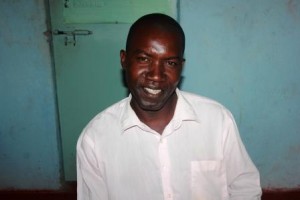 Here at African Revival, we absolutely love meeting brilliant and inspiring teachers! Mondella, from Inkumbi Basic School, is one such teacher.
Here at African Revival, we absolutely love meeting brilliant and inspiring teachers! Mondella, from Inkumbi Basic School, is one such teacher.
Mondella is originally from Mongo, a town in Zambia’s western province, but moved to Livingstone (southern province) in 1997 to study for his teaching certificate at Livingstone College of Education. Mondella has now been a teacher for fifteen years, and joined the teaching staff at Inkumbi Basic three years ago. Mondella lives on the school compound with his wife and children who attend the school. He has an 11-year old son, Naromindilla and twin daughters: Sepiso and Seveso who are six. Naromindilla is in grade 7, whilst the twins are currently in grade 1 and are taught by their mother, Natala, who is also a teacher. When your mother is your teacher, we’re sure that the old “the dog ate my home-work” excuses don’t really fly!
Mondella currently teaches grade 6, and also teaches maths and science to students in the upper basic section (secondary) of the school. Mondella actually entered the teaching profession because he was so inspired by one of his own secondary school teachers: “I used to really admire my physics, chemistry and biology teacher; he was my role model, he taught me so many things and he was just a genius because he had so much knowledge! He encouraged me a lot, and I wanted to be like him.” Just like his own teacher, Mondella likes “seeing children learn things they never knew before, and seeing them develop as individuals and as peers, it really brings joy to me”. One of the reasons Mondella loves seeing his students eager to learn is because he knows just how valuable education is, and what it can help people achieve: “(education) is so important, and the good thing is that it doesn’t choose who you are- whether you are rich or poor, as long as you can study, you can improve your life and move forward. You could be poor but if you have an education, then you can work your way up- a farmer’s son could even become president!”
 However, it can be challenging to give the children at Inkumbi the quality of teaching they deserve as the school struggles with over-enrolment and under-staffing. Although Mondella tells us that he tries his best, managing large classes is hard, and ideally he would like to divide the classes up, so that he can give individual children more attention. Although the school has its difficulties, the pupils still enjoy and benefit from their learning environment: “My pupils enjoy learning; they like school because they are learning new things, and they are able to socialise with their peers. They have time to play so they like it here.” Mondella hopes that his pupils will continue to enjoy school so that “they will complete their education, and they might be employed or self-reliant due to the knowledge which they have acquired here at school.”
However, it can be challenging to give the children at Inkumbi the quality of teaching they deserve as the school struggles with over-enrolment and under-staffing. Although Mondella tells us that he tries his best, managing large classes is hard, and ideally he would like to divide the classes up, so that he can give individual children more attention. Although the school has its difficulties, the pupils still enjoy and benefit from their learning environment: “My pupils enjoy learning; they like school because they are learning new things, and they are able to socialise with their peers. They have time to play so they like it here.” Mondella hopes that his pupils will continue to enjoy school so that “they will complete their education, and they might be employed or self-reliant due to the knowledge which they have acquired here at school.”
We think Mondella’s pupils are very fortunate to have such a passionate teacher, who works so hard to instil a love for knowledge in his students. We’re sure that, just as his teacher inspired him, Mondella has inspired many children over the years to pursue excellent vocations!
Posted in News | Tagged Africa, International Development, Teacher, Teacher training, Zambia | Leave a comment
